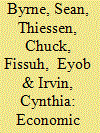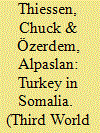|
|
|
Sort Order |
|
|
|
Items / Page
|
|
|
|
|
|
|
| Srl | Item |
| 1 |
ID:
082151


|
|
|
|
|
| Publication |
2008.
|
| Summary/Abstract |
This article examines the images of 98 study participants interviewed during the summer of 2006 and a public opinion survey of 1,023 adults conducted in October 2006 with regards to the role of the European Union (EU) Peace II Fund and the International Fund for Ireland (IFI) in community development, reconciliation, and sustainable peacebuilding. The perceptions of community group leaders, funding agency civil servants, and development officers are explored with regards to the role of both funds in building the peace dividend in Northern Ireland. Further, the article explains the importance of community development and cross-community contact through joint economic, peace and justice, and social development projects.
|
|
|
|
|
|
|
|
|
|
|
|
|
|
|
|
| 2 |
ID:
173742


|
|
|
|
|
| Summary/Abstract |
Internationally sponsored interventions in fragile and conflict-affected states are often resisted by domestic actors who have deep local knowledge, profoundly different expectations of political processes, and keen desires to shape their country’s future. Many forms of local resistance can damage or stall the progress of externally driven peacebuilding, but the critical peacebuilding literature has suffered from an inability to articulate coherent strategic alternatives to the dominant paradigm of liberal interventionism. This paradigm, we argue, is actually part of what fuels continued resistance: as external actors seek to implant liberal democratic norms into local bureaucratic and political cultures, countless sites of conflict emerge, with local and international actors jockeying between and amongst each other for position, resources, and control over the specificities of reform. These struggles – effectively a competition over local ownership – are at the centre of peacebuilding and will determine short- and long-term intervention outcomes. Focusing on the case of political reform in Afghanistan, this article develops a grounded theory of ownership as ‘meta-conflict’, in which participant voices from local and international peacebuilding leaders, working in-country, are given a primary role in determining the compatibility of the donor community’s prevailing liberal agenda with local requirements for building peace.
|
|
|
|
|
|
|
|
|
|
|
|
|
|
|
|
| 3 |
ID:
098472


|
|
|
|
|
| Publication |
2010.
|
| Summary/Abstract |
This study attempts to understand the perceived contribution of the International Fund for Ireland and European Union Peace II Fund in reducing violence and sectarianism in Northern Ireland (NI). We employ cross tabulations and nonlinear binary response models using public opinion survey data as well as analysis of 98 interviews conducted during the summer of 2006. Overall, we find Unionists to be less optimistic than Nationalists about the contribution of international economic assistance in reducing violence in NI. The perception of respondents about the role of international economic assistance in peacebuilding varies across gender, political affiliation and the nature of the relationship between individual and the funding agencies. The interview data reveals both the constructive and destructive potential of economic aid in NI's peacebuilding and post-violence development processes.
|
|
|
|
|
|
|
|
|
|
|
|
|
|
|
|
| 4 |
ID:
187997


|
|
|
|
|
| Summary/Abstract |
The use of international peacebuilding as a delivery vehicle for preventing violent extremism (PVE) initiatives is a recent and pivotal development in United Nations (UN) counterterrorism strategy. However, existing research has not considered the contradictions that emerge when international organizations transition to new peacebuilding approaches such as PVE. Further, it remains unclear whether and how intervening organizations overcome these contradictions. Based on forty-seven interviews with UN, government, and nongovernmental organization officials in Kyrgyzstan and New York this article critically analyzes the shift to PVE as an underlying strategic approach to UN peacebuilding and the mismatch between external expectations and local priorities. Interview narratives feature ambiguity in conceptions of foundational PVE concepts and in how interveners reference a menu of drivers for violent extremism according to project requirements. This article argues that ambiguity is strategically tolerated and employed, whereby not clarifying the terms of engagement with (sub-)national counterparts supports external agendas and achieves a basic unity of purpose by permitting counterparts increased managerial latitude to satisfy self-interests.
|
|
|
|
|
|
|
|
|
|
|
|
|
|
|
|
| 5 |
ID:
168484


|
|
|
|
|
| Summary/Abstract |
Turkey’s humanitarian and development intervention in Somalia is unusually illuminating as a case study to investigate the relations between emerging and conventional interveners in conflict zones since, in this case, Turkey’s intervention carries adequate impetus to resist assimilation with conventional North/Western counterparts. Our starting point is the observation that Turkish and conventional humanitarian and development interveners have struggled to coordinate or cooperate in Somalia. This article investigates what this uncooperative and uncoordinated organisational behaviour means, and we root our investigation in 21 face-to-face interviews with officials working inside the Turkish and conventional intervention in Mogadishu and Nairobi to inquire about how they understand and theorise this discordant behaviour. We use a parsimonious analytical framework of trustworthiness that questions the ‘ability’ and ‘integrity’ of counterpart organisations to explore the intentions behind organisational behaviours. Our analysis of interview narratives evidences challenges to conventional methods of intervention by Turkish organisations and the protection of the same by North/Western organisations. Our concluding discussion interprets these findings in relation to consequences for the status quo hierarchy of global governance and its promotion of liberal intervention norms, and for the utilisation of securitised and remote-control intervention methodologies in conflict zones such as Somalia.
|
|
|
|
|
|
|
|
|
|
|
|
|
|
|
|
|
|
|
|
|